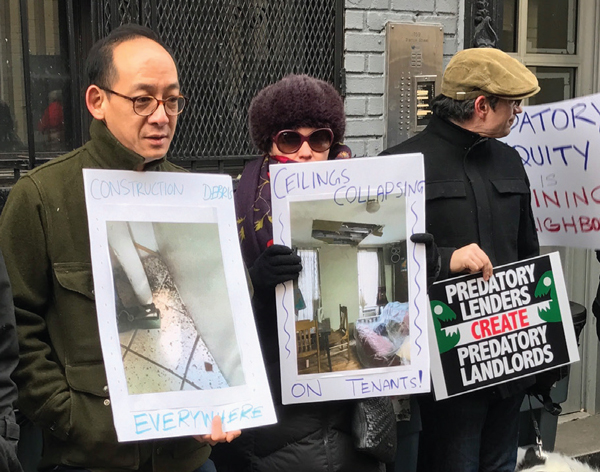When a landlord is implicated in a tenant–harassment case, it’s usually their name — and their name alone — that makes headlines.
Such was the case with Raphael Toledano at 444 East 13th Street, where rent-stabilized tenants charged that the controversial broker-turned-landlord’s management company was bullying tenants into moving out to pave the way for rent increases.
But weeks after news broke that the state was investigating Toledano for tenant harassment at the East 13th Street building, he scored two loans totaling $124 million from private equity firm Madison Realty Capital to buy and renovate a 16-building, $97 million East Village portfolio.
The leverage on the deal — which clocked in at 128 percent compared to the typical 50 to 65 percent on a New York City multifamily deal — raises questions about how culpable lenders are in perpetuating harassment. In short, are they turning a blind eye when their borrowers too-aggressively push to turn rent-stabilized apartments into luxury units?
Pressured to generate income from the buildings to pay off his loans, Toledano reportedly attempted widespread buyouts. And many of the tenants at the buildings accused him of harassment.
At 325 East 12th Street, tenants alleged that he intentionally failed to make repairs to the building’s cooking-gas lines, which have now been down for more than a year.
“Absolutely, it’s a harassment tactic,” SaMi Chester, a tenant organizer at the Cooper Square Committee who works with residents at the property, told The Real Deal. “What else could it be?”
In February 2017, Madison Realty Capital foreclosed on the building and others in the portfolio. And the following month, Toledano’s Brookhill Properties filed for bankruptcy.
Tenant groups have called out Madison and Signature Bank — which lent Madison $70 million with the Toledano loan as collateral — claiming the lenders should also be held accountable.
Attorney General Eric Schneiderman, who’s introduced state legislation to strengthen regulation on landlords, filed a 42-page objection in bankruptcy court to Madison taking over the building. The AG called the lender “predatory” and said it “shared responsibility for Toledano’s actions.” He said Toledano was “destined to default” and to “engage in unlawful conduct in an effort to meet Madison’s loan terms.”
Madison’s Brian Shatz disputed the allegation that the loan was too speculative, saying it was provided based on units that were vacated before the deal was done. He also said that since Madison took over Toledano’s portfolio, more than 200 building violations have been resolved. He said that as of late June, the gas problem was nearly repaired.
The AG’s motion also cited internal Signature emails allegedly showing that the bank knew Toledano’s plans to reposition the apartments was risky. As one Signature executive wrote: “Madison knows this business inside and out — they would have no problem foreclosing and owning these assets.”
Toledano declined to comment. Signature’s president, Joe DePaolo, disputed the allegation that his bank is overlending to unscrupulous landlords.
He pointed to recent reports by the city’s Department of Housing Preservation and Development that found no instances in the last three years of the bank’s borrowers harassing tenants.
“[Our] loans are always based on current cash flow so the landlord doesn’t feel any sort of pressure to get someone out,” DePaolo told TRD. “Should the improvements on vacant apartments allow rents to be increased, it’s only at that time on a refinance that we would give more of a loan.”
Shatz, meanwhile, said lenders simply don’t have authority to control every action their borrowers take.
“While Madison makes every effort to ensure that it is always kept abreast of underlying property conditions, it is crucial that our borrowers have the unfettered ability to operate their properties in order to not overstep our role in the normal borrower-lender relationship,” he told TRD.
“Any lender that seeks to exert too much control could open itself up to potential lender liability claims,” he added.
But it’s not just Madison that will be facing increased scrutiny. The City Council has introduced legislation to require HPD to publish a “Predatory Equity Watch List” that would put more lenders and landlords under the microscope.
